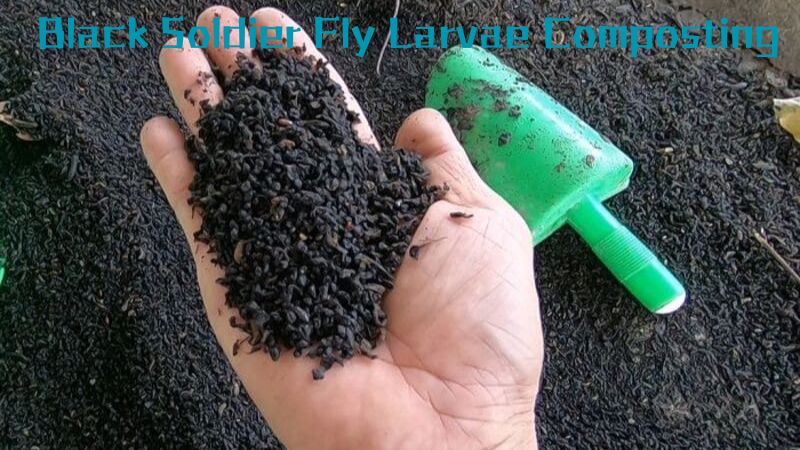Black soldier fly larvae composting is increasingly becoming an effective and sustainable solution for treating organic waste and improving soil quality. Black soldier flies, with their ability to quickly decompose waste such as manure, beer residue, and food waste, have proven useful in turning these wastes into valuable resources. In this article, Garden Creatives will explore the process of black soldier fly larvae composting, from preparing raw materials, setting up the composting environment, to harvesting and using the final fertilizer. This process not only helps reduce environmental pollution but also provides a sustainable solution for soil reclamation in agriculture and horticulture.
What are black soldier flies?
Black Soldier Fly (scientific name: Hermetia illucens) is an insect belonging to the Stratiomyidae family, notable for its ability to recycle organic waste. Below are the main characteristics of this fly:
Origin and Distribution: Black soldier flies are native to the neotropics and are now found globally, from the southern region of the United States to many other places.
Morphological characteristics
Adult Flies: Adult flies are similar in appearance to wasps and do not feed. They play a major role in reproduction.
Larval Stage (Maggot): This stage has no legs and is called a maggot or larva. This is the stage of decomposition, eating a variety of organic materials and being able to effectively treat waste.
Recycling Ability: Black soldier flies are decomposers capable of consuming organic waste such as manure, beer residue, food waste, sludge from paper mills, and carrion. They help compost organic waste into nutrient-rich fertilizer and can be harvested for animal feed.
Application: Black soldier flies are used in waste recycling systems to produce fertilizer and animal feed, contributing to waste reduction and improved soil health.
Application of black soldier fly in organic fertilizer production
Firstly, black soldier flies are most commonly used to collect manure to produce fertilizer for plants. However, we collect feces from the larval stage of black soldier flies, not from adult black soldier flies. The collected fly larvae feces will be dried. At this point, the fertilizer will look like shredded soil, very good for fertilizing plants.
Second, black soldier flies can decompose livestock manure without causing odors, without creating a greenhouse effect and without generating wastewater, which helps reduce waste volume by 80% to 90%. Very suitable for livestock and crop farming models.
Third, organic fertilizer from black soldier flies has high nutrient content, with a relatively low cost compared to investing in buying fertilizer from factories.
Fourth, producing organic fertilizer from black soldier flies not only provides fertilizer for plants but also makes it possible to produce organic fertilizer from black soldier flies to sell for profit to farmers.
Effects of black soldier fly larvae feces on plants
Helps increase the ability to stimulate plant growth, keep soil moist and prevent pests and diseases…
Provides nutrients for plants
Provides necessary nutrients for plant growth such as nitrogen, calcium, potassium, phosphorus, magnesium, etc. In addition, it also contains manganese, copper, zinc, iron, etc. These substances help plants grow easily. It is easily absorbed, unlike other organic fertilizers that require water to decompose.
Add beneficial microorganisms to improve soil and resist diseases
Contains many beneficial microorganisms such as nitrogen-fixing bacteria (Azotobacter), cellulose degrading, phosphorus degrading and biological catalysts. When applied to the soil, microorganisms will work strongly to help improve the soil and resist pests.
Keeping pH stable helps plants absorb nutrients easily
Black soldier fly larval feces has a pH of 7, so it helps plants grow stably in moderate soil pH conditions.
Stimulates growth
Contains Humic Acid, which helps stimulate the growth, flowering, and fruiting of plants. In addition, Humic Acid also stimulates the growth of beneficial microorganisms in the soil.
Keeps soil moist, prevents erosion
This type of fertilizer has a cubic shape so it has the ability to retain water in the soil, help the soil become loose, retain moisture longer, and improve the soil to prevent erosion.
Producing simple black soldier fly larvae composting at home
Prepare materials
Styrofoam containers, buckets or plastic trays with lids.
Leftover rice
Rice water, bean shells
Soybean residue (bean residue)
Discarded vegetables, fruit peels
Organic waste
Biomass of black soldier fly larvae
Implementation steps
Step 1: Place the foam container, bucket or plastic tray in a cool location. Note that the box must have a lid to protect it from sun and rain as well as to prevent damage from rats or insects.
Step 2: Put organic waste materials into the bin such as rice water, leftover rice, bean shells, bean residue, kitchen leftover vegetables, fruit peels, etc. (Organic waste should be chopped into small pieces to allow the decomposition process to proceed. out faster).
Step 3: Prepare biomass of black soldier fly larvae. You can get this biomass by buying eggs to incubate.
Step 4: Sprinkle black soldier fly larvae biomass evenly on the surface of organic waste in the plastic bin.
Step 5: Close the lid to let the black soldier fly larvae decompose organic waste.
Step 6: Black soldier fly larvae are a species that can decompose trash very quickly. You only need 7-14 days to harvest larval feces.
Conclude
Black soldier fly larvae composting not only provides significant environmental benefits but also provides an effective method for processing organic waste and creating high-quality fertilizer. By applying the key steps in the black soldier fly larvae composting, from selecting raw materials, maintaining suitable environmental conditions, to harvesting and using fertilizers, you not only contribute to protecting the environment but also improve agricultural production efficiency. The black soldier fly is a prime example of how innovation in biotechnology can help us solve environmental and sustainable development problems.





